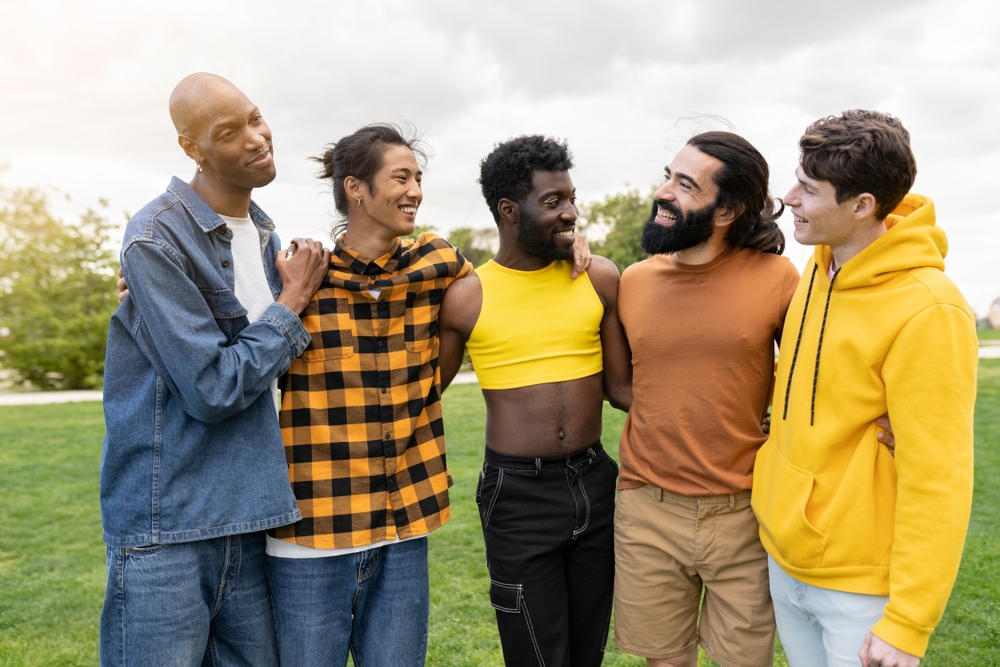Breaking Stereotypes: Gay Doesn’t Equal Feminine, Straight Doesn’t Equal Masculine
(Photo Credits: PintoArt from Shutterstock)
Sexuality and gender expression have long been intertwined in the public imagination, often leading to inaccurate assumptions. A recent online post stated, “Gay doesn’t mean ‘feminine guy’ and straight doesn’t mean ‘masculine guy.’ That’s all, hope you get it.” This straightforward remark highlights a crucial point: sexual orientation is about attraction, not personality traits or gender presentation.
Yet, stereotypes persist. Gay men are often expected to be feminine, and straight men are presumed masculine. These societal assumptions overlook the diversity within each group. As one gay man online put it, “I met this straight guy once who was so feminine and flamboyant, I felt my brain went haywire. Compared to him, I was the most masculine guy in the world Lmfaoo.” This shows how stereotypes can fail to align with reality.
Other users emphasized the need to separate orientation from behavior. “No. Gay means you are sexually attracted to the same sex,” one explained, while another added, “Everything else, like how we behave or dress, is separate.”
Despite this clarity, stereotypes still influence interactions within the LGBTQ+ community. One user noted, “Seriously, hate when I hear people call it homophobic to prefer masc men or to be masc. Newsflash, both are equally gay.” This sheds light on how internalized expectations can add pressure to an already complex dating landscape.
Interestingly, some users reflected on why these assumptions exist. “You’re just a guy who likes other guys. Where is everything else coming from?” one wondered. While cultural patterns might explain why femininity is more visible in some gay circles, this doesn’t justify reducing anyone’s identity to a stereotype.
This brings us to an essential question: how do these stereotypes affect dating and relationships? Do you find that being perceived as more masculine or feminine impacts the kind of people you attract or the roles you’re expected to play in a relationship? Have these assumptions ever led to awkward or limiting experiences in your love life?
Ultimately, what matters most is embracing individuality. Gender expression is deeply personal, and no one should feel confined to labels or expectations. Whether you’re a masculine gay man, a feminine straight man, or anywhere in between, your identity is valid.
Adam4Adam blog readers, have you felt boxed in by stereotypes? How do you navigate these assumptions in your daily life or when dating? Share your thoughts and stories in the comments section —we’re eager to hear your perspective!










i am more “boxed” by being older than being homosexual. being homosexual is nature; being gay is societal. i believe that homosexuals are not all gay but all gays are homosexuals. perhaps, this might be the essence of what the blog’s reference is about?
Being gay and being homosexual are the same thing. They’re synonyms.
Gay is the word for being open about being homophile. Homosexual is the action, and a misnomer.
Homosexuality was at the start of civilization; the concept of Gay started around the late 1950s?
Here’s a very blunt confession from someone who’s married to my wife of over 3 decades and as hidden in the closet as can be: Sexually, I once was about 50% into her or other women and 50% into guys. Today, I’m 110% into guys, but maintain my happy married family life. Hers and my love life has all but disappeared but neither of us complains so we live on happily and I’m able to get my fill of gay sex on the side. That all said…throughout my life I’ve gone to great pains to maintain my “macho hetero” exterior.… Read more »
And you are offering nothing of yourself to your partners but your body. You are using them. Just make sure they understand that.
I’m troubled with guys these days who say they’re “in the closet” or “on the Down Low”. It’s not a positive place as far as society and The Community are concerned. It’s their choice to say so, but .. Plenty of men who have sex with men are married to women. Many of their wives know they have male friends that include having sex. Some never have a woman in their life. Being “in the closet” or “on the Down Low” seems to be a shameful place when it just means any guy who doesn’t broadcast his sexuality … Straight,… Read more »
To Father: I’m always totally up front about that to my assorted sex partners. I may totally hide “the real me,” but the “just for gay sex me” is 110% open and honest.
To Hunter: You seem to be sticking up for guys like me, but I’ll humbly & frankly say that I deserve to be scorned by society. I’m not being fully open and honest with my wife or family, but that’s the price I have to pay to get what I desire and not lose my family.
I can identify with your story. Especially how you broke down your sexuality towards male and female.
Nice to hear. Never ceases to amaze me how many other guys out there are like us.
DAM I thought I was reading my BIO. Bimm my life is exactly like yours. I agree with everything you have stated .
I can identify with you. I am in the same situation married for almost 4 decades, no hetero sex, but we love being with each other. Sexually I am totally into men and have found a few in the same situation as me who enjoy male sex with discretion.
The most stereotyping people I have encountered are trans people, who mistake a stereotype for identity.
Well, I absolutely do not agree that being Gay is societal !! I was Gay so long before I knew what societal even meant, and I thought that having sex with other guys was just how things were, by this I mean the interaction between guys.
I was a little Gay boy from birth. Yes, I am masculine, and loathe femininity. Nothing personal for those who are, it’s just not to my taste.
“Gay” guys are fem, flamboyant, fairy, and/or feathery. They probably adore and worship fashion, celebrities and music divas. They often steal the spotlight in any social situation, making it all about them and their sexuality. They are the stereotype that “The Community” and the media have perpetuated, and continue to do so. While having gained acceptance and tolerance over the years from Society, they’re just plain annoying to most people. Their sexuality is primary to who they are. Then there are everyday guys who are attracted to men. If they are so, it’s often not evident. Many are married with… Read more »
Nope. Got it wrong.
Typical Gay stereotypes = love female singers, love fashion, extremely neat/tidy, don’t like/play sports, know nothing about cars, always in the gym, speak with lisps
This is what the stereotype is. Spot on description sir
Thank you for distinguishing between sexual orientation and the mythic “gender expression.” Being gay is about who you love and have sex with. Ideally, it’s the heart, mind and groin in hopefully equal balance. Gender is completely different. Which is why a heterosexual woman who thinks she is a “man” and transitions (often in not all body parts) is still heterosexual, especially when she still has a vagina. Even if it is true that the gender part of her brain might be male, the other 99% is still female. Cross-dressing has nothing to do with sexuality, except as a fetish.
. . . I took my first ques, from the fact of being an African American male, I ‘consciously’ chose not to be “typical” taking pride in ‘who’ I am to myself, first and foremost, as I saw ‘other’ examples, I said “not me.” Same thing, being a “homo”, I came to the conclusion while observing the men in dress, “nope, not me” either. But I also witnessed the overly compensating ‘hyper-masculine’ bullshitters, too, “nope, not me either.” If, you know who you are to yourself, fuck the gay community and their bullshit, as well as the world at large,… Read more »
I have know of plenty of so called masculine men who were stone cold bottoms and plenty of feminine looking and sounding men who were hard core tops and damn good at it.